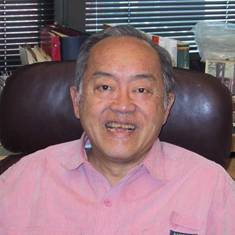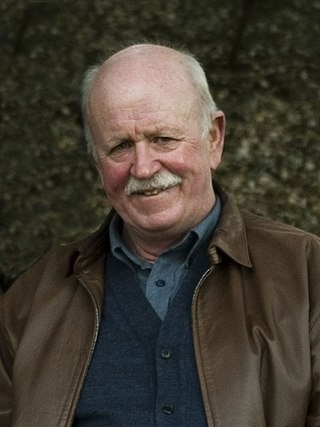Petar V. Kokotovic is professor emeritus in the College of Engineering at the University of California, Santa Barbara, USA. He has made contributions in the areas of adaptive control, singular perturbation techniques, and nonlinear control especially the backstepping stabilization method.

Eduardo Daniel Sontag is an Argentine-American mathematician, and distinguished university professor at Northeastern University, who works in the fields control theory, dynamical systems, systems molecular biology, cancer and immunology, theoretical computer science, neural networks, and computational biology.
Roger Ware Brockett was an American control theorist and the An Wang Professor of Computer Science and Electrical Engineering at Harvard University, who founded the Harvard Robotics Laboratory in 1983.
Harold (Hall) Chestnut was an American electrical engineer, control engineer and manager at General Electric and author, who helped establish the fields of control theory and systems engineering.
The Richard E. Bellman Control Heritage Award is an annual award given by the American Automatic Control Council (AACC) for achievements in control theory, named after the applied mathematician Richard E. Bellman. The award is given for "distinguished career contributions to the theory or applications of automatic control", and it is the "highest recognition of professional achievement for U.S. control systems engineers and scientists".

Yu-Chi "Larry" Ho is a Chinese-American mathematician, control theorist, and a professor at the School of Engineering and Applied Sciences, Harvard University.
Arthur Earl Bryson Jr. is the Paul Pigott Professor of Engineering Emeritus at Stanford University and the "father of modern optimal control theory". With Henry J. Kelley, he also pioneered an early version of the backpropagation procedure, now widely used for machine learning and artificial neural networks.
Mustafa Tamer Başar is a control and game theorist who is the Swanlund Endowed Chair and Center for Advanced Study Professor of Electrical and Computer Engineering at the University of Illinois at Urbana-Champaign, USA. He is also the Director of the Center for Advanced Study.
Harold Joseph Kushner is an American applied mathematician and a Professor Emeritus of Applied Mathematics at Brown University. He is known for his work on the theory of stochastic stability, the theory of non-linear filtering, and for the development of numerical methods for stochastic control problems such as the Markov chain approximation method. He is commonly cited as the first person to study Bayesian optimization, based on work he published in 1964.
Michael Athans was a Greek-American control theorist and a Professor Emeritus in the Department of Electrical Engineering and Computer Science at the Massachusetts Institute of Technology. He was a Fellow of the IEEE (1973) and a Fellow of the AAAS (1977). He was the recipient of numerous awards for his contributions in the field of control theory. A pioneer in the field of control theory, he helped shape modern control theory and spearheaded the field of multivariable control system design and the field of robust control. Athans was a member of the technical staff at Lincoln Laboratory from 1961 to 1964, and a Department of Electrical Engineering and Computer Science faculty member from 1964 to 1998. Upon retirement, Athans moved to Lisbon, Portugal, where he was an Invited Research Professor in the Institute for Systems and Robotics, Instituto Superior Técnico where he received a honoris causa doctorate from the Universidade Técnica de Lisboa in 2011.
The IEEE Control Systems Award is a technical field award given to an individual by the Institute of Electrical and Electronics Engineers (IEEE) "for outstanding contributions to control systems engineering, science or technology". It is an IEEE-level award, created in 1980 by the board of directors of the IEEE, but sponsored by the IEEE Control Systems Society.

Dimitri Panteli Bertsekas is an applied mathematician, electrical engineer, and computer scientist, a McAfee Professor at the Department of Electrical Engineering and Computer Science in School of Engineering at the Massachusetts Institute of Technology (MIT), Cambridge, Massachusetts, and also a Fulton Professor of Computational Decision Making at Arizona State University, Tempe.

Mathukumalli VidyasagarFRS is a leading control theorist and a Fellow of Royal Society. He is currently a Distinguished Professor in Electrical Engineering at IIT Hyderabad. Previously he was the Cecil & Ida Green (II) Chair of Systems Biology Science at the University of Texas at Dallas. Prior to that he was an executive vice-president at Tata Consultancy Services (TCS) where he headed the Advanced Technology Center. Earlier, he was the director of Centre for Artificial Intelligence and Robotics (CAIR), a DRDO defence lab in Bangalore. He is the son of eminent mathematician M V Subbarao.
Pravin Pratap Varaiya was Nortel Networks Distinguished Professor in the Department of Electrical Engineering at the University of California, Berkeley.

Arthur James Krener is an American mathematician. He is a distinguished visiting professor in the department of applied mathematics at the Naval Postgraduate School. He has made contributions in the areas of control theory, nonlinear control, and stochastic processes.
A. Stephen Morse is the Dudley Professor of distributed control and adaptive control in electrical engineering at Yale University.
Anuradha M. Annaswamy is a computer scientist noted for her research on adaptive control theory and smart grids. Since 1996, she has worked at the Massachusetts Institute of Technology. Currently, Annaswamy is a senior research scientist at the Department of Mechanical Engineering at the Massachusetts Institute of Technology, and directs the Active Adaptive Control Laboratory.
Donald C. Wunsch II is Mary K. Finley Distinguished Professor of computer engineering at the Missouri University of Science and Technology, and a Fellow of the Institute of Electrical and Electronics Engineers He is known for his work on " hardware implementations, reinforcement and unsupervised learning".
The Hendrik W. Bode Lecture Prize is an award given by the IEEE Control Systems Society (CSS) to recognize distinguished contributions to control systems science or engineering. It was established in 1989, named after Hendrik W. Bode (1905–1982), a pioneer of modern control theory and system engineering, who revolutionized both the content and methodology of his chosen fields of research during his long career at Bell Labs and Harvard University.
Frank L. Lewis is an American electrical engineer, academic and researcher. He is a professor of electrical engineering, Moncrief-O’Donnell Endowed Chair, and head of Advanced Controls and Sensors Group at The University of Texas at Arlington (UTA). He is a member of UTA Academy of Distinguished Teachers and a charter member of UTA Academy of Distinguished Scholars.




